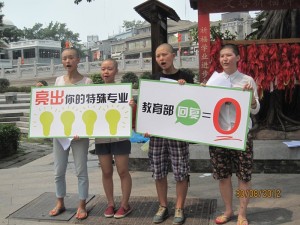With a new car purchased in China approximately every 2.3 seconds, the auto industry hasn’t exactly been helping to improve the country’s air quality. In 2009, China surpassed the US as the largest manufacturer and consumer of automobiles in the world, and is set to pass 250 million vehicles. To put those numbers in perspective, in 1990, there were only 5.54 million vehicles on Chinese roads.
Yet while the automobile has become big business in China, electric cars haven’t quite taken off as expected. In 2012, the State Council of China initiated a plan to develop and promote new energy vehicles, with projections of 500,000 units by 2015. Sales have so far failed to meet expectations and, earlier this year, the national government lowered its target to 160,000 units.
Those numbers may finally get the boost the national government has hoped for with last Friday’s announcement that electric car manufacturer, Tesla Motors, has inked a deal with China United Network Communications Corp., the country’s second-largest mobile phone company. The agreement sets out an ambitious plan to build 400 charging stations at China Unicom outlets in 120 Chinese cities. The deal also includes construction of 20 “rapid-charge” stations which are said to work as much as 16 times faster than their conventional counterparts.

The Tesla Model S at one of its charging stations.
Not to be outdone by Tesla, the central government is also looking to get in on the action. According to a report in Automotive News, the government is considering spending up to 100 billion yuan to encourage demand for clean cars and expand charging facilities. While it will be sometime before we see as many electric cars in China as there are E-bikes (there were 100 million of them purchased in the last decade, more than all other countries combined), at least the country is moving in the right direction.
Yet while electric technology appears to be the next logical step for a country that has fallen in love with the automobile, not everyone is excited about China’s push for the electric car. A 2012 study published in the Journal of Environmental Science and Technology, analyzed the emissions and environmental health impacts of five vehicle technologies (gasoline and diesel cars, diesel buses, e-bikes and e-cars), in 34 Chinese cities. Surprisingly, the study found that the overall particulate matter pollution of electric cars, which includes acids, organic chemicals, metals and soil or dust particles, can actually be worse than that of their petrol pumping predecessors: “An implicit assumption has been that air quality and health impacts are lower for electric vehicles than for conventional vehicles,” said Chris Cherry, one of the authors of the study. “Our findings challenge that by comparing what is emitted by vehicle use to what people are actually exposed to.”
In China’s case, there is also the very real consideration of the energy intensive manufacturing of electric vehicles, largely due to the energy and materials necessary to build lithium-ion batteries. China continues to be the largest consumer of coal in the world, with more than 80 percent of the country’s electricity generated from coal-fired power stations, and approximately one large coal plant built every week.

In China, a new coal plant is built every week.
As a result, the net benefit of electric cars produced by coal-generated electricity may actually be a net loss. In an interview with the BBC, Guillaume Majeau-Bettez, one of the authors of a recent Norwegian study published in the Journal of Industrial Ecology examining the life cycle of conventional and electric vehicles, said that from an environmental standpoint, the success or failure of the electric car will be dependant upon how much we can clean up our electricity grid “both for the electricity you use when you drive the car, and for the electricity used for producing the car.”
While further inroads in clean, electric vehicle infrastructure in China is certainly promising, there’s still that dirty coal issue required to manufacture it that needs to be addressed. China hopes to raise its use of non-fossil energy to 11.4% of total energy consumption by 2015; but, it clearly still has a long way to go. While clean energy is critical to the future of China’s development, it’s important to keep in mind that all energy sources come at a cost: “There is no such thing as zero-emission anything, whether a zero-emission vehicle or a zero emission building,” said Majeau-Bettez.


















